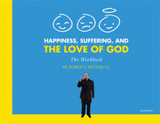Product Overview
Click "Product Videos" below to watch Mark Giszczak discuss Suffering: What Every Catholic Should Know on the Ignatius Press Podcast.
Just as Job was tried, all of us are tested by suffering. It comes to us in many different forms: grief about the past, pain in the present, and sadness about what might have been. The personal dimension of suffering means that it marks our experience and, in some ways, makes us who we are.
Coping with suffering as Christians includes certain spiritual practices that lead us to surrender our lives more fully to the Lord. By offering our suffering as a spiritual sacrifice, joined intentionally to the suffering of Christ through prayer, we engage with the most profound Christian teaching about suffering: that it is redemptive. Suffering can transform us to be like God.
Editorial Reviews
"Many of us think if we do everything 'right' that God will keep us from suffering and that God is 'unjust' if suffering crosses our path. This book is a very helpful companion as we struggle to understand and respond to the mystery of suffering which none of us can escape. It will help you live a more joyful and fruitful life."
— Charles J. Chaput, O.F.M., Cap., Archbishop Emeritus of Philadelphia
"A perfect book for those wrestling with the problem of why God allows good people to suffer. Giszczak tackles the tough questions with compassion, clarity, wit, and deep Catholic faith."
— Mary Healy, Professor of Sacred Scripture, Sacred Heart Major Seminary
"One of the deepest mysteries of the faith is why we must continue to suffer after Christ's victory on the Cross. Didn't Christ deal the devil a 'knock-out blow'? This work is a pastorally sensitive guide to an authentically Catholic understanding of this mystery. It will be a source of consolation to many."
— Professor Tracey Rowland, St. John Paul II Chair of Theology, University of Notre Dame (Australia)
"All of us suffer, but not many of us suffer well. I highly recommend this book to all wanting to find purpose and fulfillment in the inevitable trials we face."
— Bob Schuchts, Author, Real Suffering; Founder, John Paul II Healing Center
"Dr. Giszczak has given us a detailed theology, helping us to better understand suffering in our lives, and to allow ourselves to realize its transforming power."
— Jim Beckman, Executive Director, ImpactCenter
"A richly rewarding book that combines humble, straightforward honesty with a transformative practical vision!"
— Matthew Levering, James N. Jr. and Mary D. Perry Chair of Theology, Mundelein Seminary










